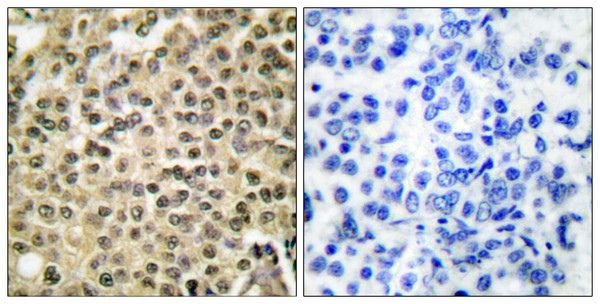| Post Translational Modifications | Acetylation by KAT5 at Lys-134 is increased during mitosis, impairs RANGRF binding and enhances RCC1 binding. Acetylation at Lys-37 enhances the association with nuclear export components. Deacetylation of Lys-37 by SIRT7 regulates the nuclear export of NF-kappa-B subunit RELA/p65. |
| Function | GTPase involved in nucleocytoplasmic transport, participating both to the import and the export from the nucleus of proteins and RNAs. Switches between a cytoplasmic GDP- and a nuclear GTP-bound state by nucleotide exchange and GTP hydrolysis. Nuclear import receptors such as importin beta bind their substrates only in the absence of GTP-bound RAN and release them upon direct interaction with GTP-bound RAN, while export receptors behave in the opposite way. Thereby, RAN controls cargo loading and release by transport receptors in the proper compartment and ensures the directionality of the transport. Interaction with RANBP1 induces a conformation change in the complex formed by XPO1 and RAN that triggers the release of the nuclear export signal of cargo proteins. RAN (GTP-bound form) triggers microtubule assembly at mitotic chromosomes and is required for normal mitotic spindle assembly and chromosome segregation. Required for normal progress through mitosis. The complex with BIRC5/survivin plays a role in mitotic spindle formation by serving as a physical scaffold to help deliver the RAN effector molecule TPX2 to microtubules. Acts as a negative regulator of the kinase activity of VRK1 and VRK2. Enhances AR-mediated transactivation. Transactivation decreases as the poly-Gln length within AR increases. |
| Protein Name | Gtp-Binding Nuclear Protein RanAndrogen Receptor-Associated Protein 24Gtpase RanRas-Like Protein Tc4Ras-Related Nuclear Protein |
| Database Links | Reactome: R-HSA-165054Reactome: R-HSA-1655829Reactome: R-HSA-168333Reactome: R-HSA-180746Reactome: R-HSA-203927Reactome: R-HSA-5578749Reactome: R-HSA-6784531Reactome: R-HSA-9615933 |
| Cellular Localisation | NucleusNucleus EnvelopeCytoplasmCytosolMelanosomePredominantly Nuclear During InterphaseBecomes Dispersed Throughout The Cytoplasm During MitosisIdentified By Mass Spectrometry In Melanosome Fractions From Stage I To Stage Iv |
| Alternative Antibody Names | Anti-Gtp-Binding Nuclear Protein Ran antibodyAnti-Androgen Receptor-Associated Protein 24 antibodyAnti-Gtpase Ran antibodyAnti-Ras-Like Protein Tc4 antibodyAnti-Ras-Related Nuclear Protein antibodyAnti-RAN antibodyAnti-ARA24 antibodyAnti-OK antibodyAnti-SW-cl.81 antibody |
Information sourced from Uniprot.org











